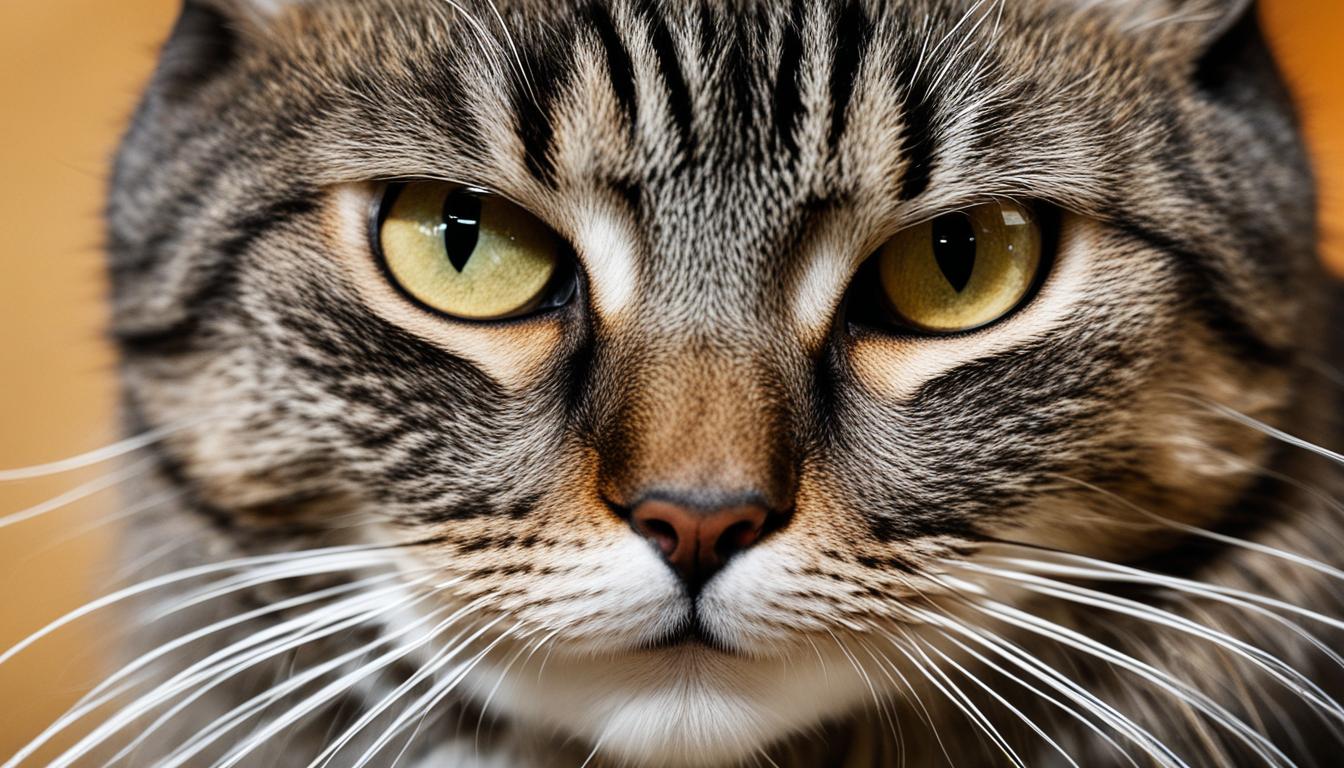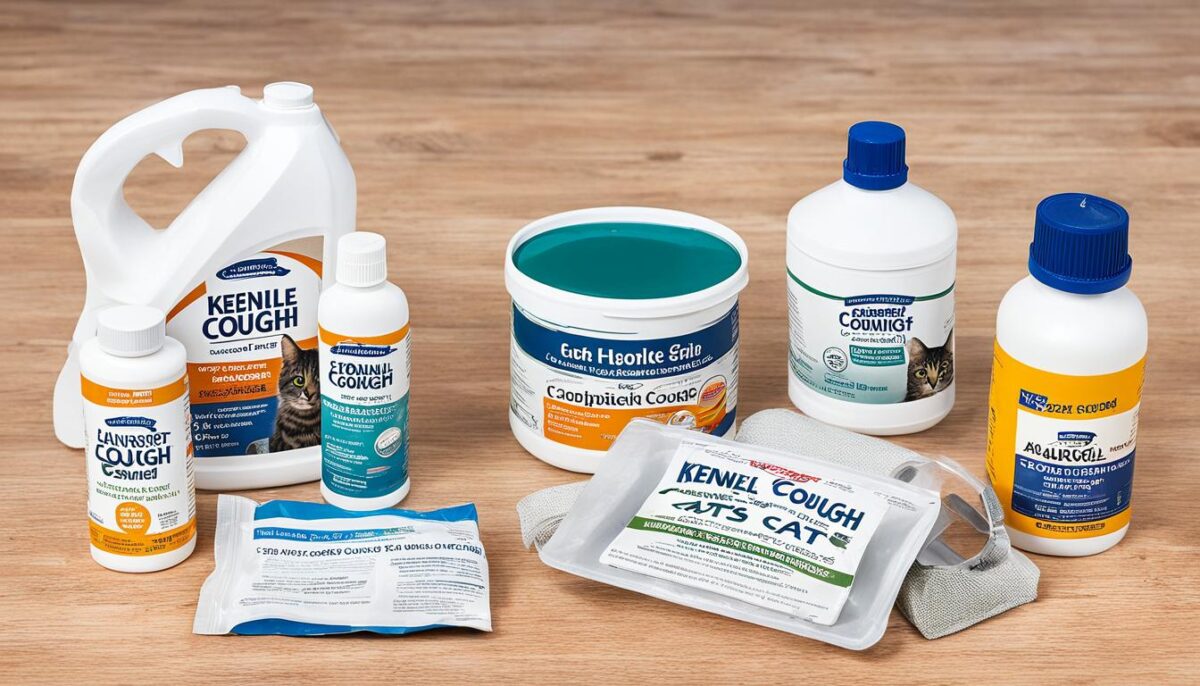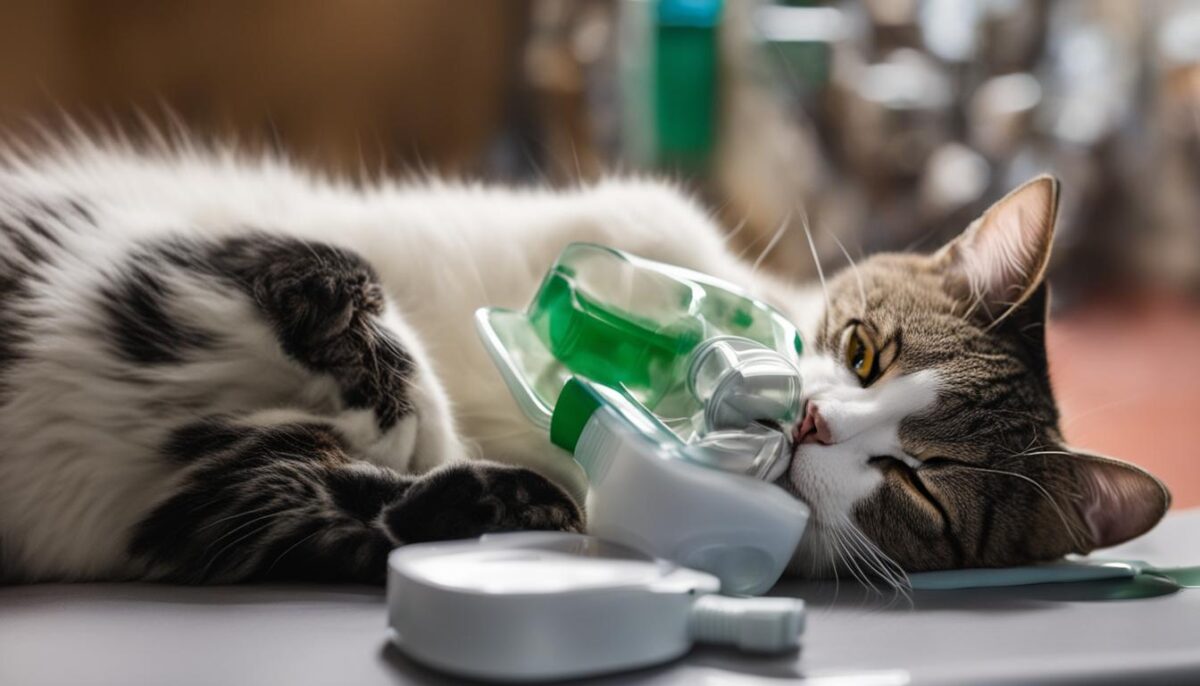As a caring pet owner, you might wonder if your purring pal can get sick from kennel cough, a problem you often hear about with dogs. Yes, our feline friends can catch this cough too. It’s not as common in cats, but it’s something to watch for. The big name for this sickness is infectious tracheobronchitis in cats, and it comes from a germ called Bordetella bronchiseptica. When you hear your cat cough, it’s smart to see the vet. They’ll figure out if it’s kennel cough or something else. Taking care of your cat’s cat respiratory health is part of keeping them happy and healthy. Don’t worry, we’ve got some pet care tips to help you out.
Now, let’s think about how to keep things safe for your cat. It’s good to know what might make your furry buddy sick and how you can help them stay well. Knowing about feline kennel cough risks could make a big difference for your cat’s pet health. We’ll talk about the signs of a cough, how to help a sick cat, and ways to keep kennel cough away from your pet.
Key Takeaways
- Cats can catch a cough called infectious tracheobronchitis.
- It’s rare, but it’s something to look out for in your cat’s health.
- Seeing the vet is important if your cat starts coughing.
- Keep your pet’s space clean and cozy to help them stay well.
- There are ways to keep your cat from getting kennel cough.
Understanding Kennel Cough in Cats
Have you ever heard your cat cough or sneeze? Sometimes, just like us, cats can catch a cold or even something called kennel cough. Let’s talk about what this is and why we should take care of our furry friends when they get sick.
Defining Infectious Tracheobronchitis
Kennel cough, or infectious tracheobronchitis, is kind of like a bad cold for cats. It can make their throat and airways sore and irritated. This sickness can be caused by a germ named Bordetella bronchiseptica. While it’s more common in dogs, cats can get it too, especially if they share space with others or touch things that sick pets have coughed or sneezed on.
Comparing Feline and Canine Kennel Cough
Kennel cough can show up differently in cats and dogs. Dogs often have a loud, honking cough, but cats might just sneeze, seem tired, or not want to eat. Even if your cat doesn’t act very sick, it’s important to help them feel better and keep them away from other pets to stop the sickness from spreading.
Is Kennel Cough a Big Concern for Cats?
As a caring pet owner, you might wonder if kennel cough is a big worry for your cat. It’s true that dogs often have a rougher time with it, but your cat still needs a trip to the vet if they catch it. The vet can help your cat recover quickly and give you tips to stop such sicknesses in the future. Remember, keeping your cat healthy with good food, clean water, and plenty of love is the best way to keep them happy and free from pet diseases like kennel cough.
Can Cats Get Kennel Cough?
Did you know that your purring pals can catch a cold just like you? It’s called feline kennel cough and it can make them feel pretty yucky. Just like you might catch a cough from your classmates, cats can get this icky illness from other fur-friends, whether they’re dogs or other cats.
Let’s pretend you have a toy that you’ve been playing with, and then you share it with someone else. If a toy has yucky germs on it, the next person to play with the toy might get sick too. That’s kind of what happens with pet disease transmission. Cats can get kennel cough if they share things like their water bowls or little fluffy toys with a sick buddy.
The germs that cause kennel cough love to travel from one sniffling pet to another. It’s not just through sharing toys though; sometimes all it takes is one sneezy face-to-face “hello” and the germs jump across to a new cat friend.
It’s pretty rare, but humans can get a light version of this cough too. However, it’s mostly our four-legged friends that need to worry. To keep your furry family member from catching kennel cough, good cleaning is super important. After all, nobody likes being sick, not even our whiskered companions!
| Who Can Get Sick | How They Get Sick |
|---|---|
| Cats | From other cats or dogs, sharing bowls and toys |
| Dogs | From other dogs, kennels, or parks |
| Humans | Very rare, usually from close contact with sick pets |
Remember, your cuddly cat relies on you to help keep them healthy, so always wash your hands and keep their stuff clean! If your kitty starts coughing or feeling sick, it’s vet-check time to make sure they bounce back to their playful, pouncing self again!
Identifying Symptoms of Kennel Cough in Felines
When your kitty starts showing certain signs, it could mean they have cat coughing symptoms. As a responsible pet parent, keep your eyes open for warning signs of illness in cats. These signs include sneezing, coughing, and gooey stuff coming from their eyes or nose.
If you notice your furry friend is not as playful as usual and seems tired, or doesn’t want to eat much, these could be clues that something’s not right. Remember, sneezing and discharge in pets can happen, but if you see it a lot, it’s time to take action.
Sneezing, Coughing, and Discharge: Recognizing the Signs
Cats might sneeze and cough for simple reasons like dust bunnies or a little tickle in their throat. However, if those sneezes and coughs keep coming, they might be signs of feline respiratory disease. Your cat could also have a runny nose or weepy eyes. Take a peek at the table below to see the common symptoms:
| Symptom | What to Look For |
|---|---|
| Coughing | Your cat sounds like they’re trying to hack up a hairball, but nothing’s coming out. |
| Sneezing | More than a couple of sneezes, especially with other signs. |
| Discharge | Watery or goopy eyes/nose. |
| Lethargy | Your usually playful kitty doesn’t want to move much. |
| Loss of Appetite | They aren’t interested in their favorite treats or food. |
When Symptoms Suggest More Than Just a Cough
If your cat has bad coughing fits, doesn’t want to run and play, or has a hard time breathing, it’s important to see a vet right away. These could be serious warning signs of illness in cats. The vet will check your cat and help them feel better. Always remember that loving your pet means looking out for their health, so keep an eye out for these signs.
Transmission and Risk Factors for Cats
Do you wonder how cats get sick with something like kennel cough? It’s not just about being around other sneezy cats. It’s important to know about kennel cough risk factors so you can help keep your furry friend healthy.
How Do Cats Contract Kennel Cough?
Just like us, when cats are in places with lots of other cats, they can catch germs easier. This includes shelters or even when they visit places with other pets. When cats share spaces and things like bowls or toys, they can get and spread kennel cough.
The Role of Environment and Immune Health
Your cat’s surroundings can also affect their health. Places that don’t have fresh air or have things like smoke can make it easier for cats to get sick. And just like you eat your veggies to stay healthy, a cat’s immune system needs to be strong to help fight off sickness. That’s why things like good food, clean water, and vaccinations are so important for your cat.
| Risk Factors | Description | Prevention Tips |
|---|---|---|
| Crowded Spaces | Too many cats in one place can spread germs. | Give cats their own space and avoid overcrowded areas. |
| Poor Air Quality | Bad ventilation or smoke can harm a cat’s lungs. | Make sure your cat lives in a well-ventilated area free from smoke. |
| Weak Immune System | A weak immune system can’t fight germs well. | Keep your cat healthy with good food and regular vaccines. |
Diagnosis and Veterinary Interventions
If your cat starts coughing, it’s time to visit the vet. The vet will look, listen, and maybe do some tests to see what’s going on. Imagine playing detective to solve a mystery. That’s what the vet does when they are diagnosing cat cough. They might need to get a picture of the inside of your cat with an x-ray or take a tiny bit of blood to check for germs.
When it comes to treatment for cat kennel cough, your vet might give special medicine that helps your cat stop coughing and start feeling better. They know the right kind of medicine to give, so it’s important we listen to them. Sometimes they might even suggest vitamins to help your cat’s body fight off the germs.
If your cat has a really bad cough, they might need to stay at the vet for a little while. Going to the vet is like having a special doctor for your cat. They know just what to do and will take good care of your furry friend.
- Vet visits for respiratory issues help your cat breathe easier.
- Feline medical tests might include cool machines that take pictures of the inside of your cat or tiny needles that take a little bit of blood to look for sneaky germs.
- Medicine should only be given when the vet says so, because they know the safe kind for cats.
Effective Treatments for Kennel Cough in Cats
When your cat catches a cough, it can be worrisome. Kennel cough is one sickness that can make your furry friend feel bad. To help your cat get better, your vet might give special medicine. Remember, it’s important to only use safe medications for pets and follow what the vet tells you. This will help your cat feel cozy and bounce back faster.
Antibiotics and Supportive Care Options
For treating kennel cough in felines, antibiotics are often used. These fight the pesky germs making your cat sick. Alongside, your cat might need medicine to calm the cough. Sometimes, vets suggest extra vitamins to make your cat’s body stronger. Remember to give your cat lots of love and a peaceful spot to rest at home.
The Importance of Following Veterinary Advice
Listening to your vet is super key for your cat’s recovery care. They know what’s best for your pet and can guide you on the right path. Always ask them before giving your cat any new medicine. Following their advice will make sure your cat gets the right treatment and care it needs to get back to purring and playing.
- Use only vet-approved treatments for your cat’s cough.
- Keep a cozy recovery space for your cat to rest and heal.
- Remember, patience is important—kitties need time to get better.
Prevention Strategies for Kennel Cough
Keeping your cuddly cat healthy is very important. One way to help do this is by minimizing infection risks. Kennel cough isn’t fun for anyone, not for dogs and especially not for cats. But, did you know there are ways to help stop your furry friend from getting sick? Let’s find out how!
First things first, pet vaccination is key. It’s like wearing a helmet when you ride a bike – it protects you! Vaccines help keep your pet from getting certain sicknesses. When it comes to kennel cough, there is something called the Bordetella vaccine for cats. However, this shot is not given to cats very often because most cats don’t usually get kennel cough.
In fact, if your cat stays inside, it helps a lot! Indoor cats are not around other animals that might be sick. This means they are less likely to catch something bad. Think of it like staying inside when it’s super cold so you won’t get a cold.
But even indoor cats like to be healthy. Health prevention in felines means doing little things to keep them from getting sick. It includes clean food bowls, fresh water, and a tidy litter box. Just like you, cats feel better when their home is clean!
| Prevention Tip | How It Helps |
|---|---|
| Keeping up with vaccinations | Shields your cat from many common sicknesses |
| Staying indoors | Less chance of meeting germy friends |
| Clean eating and drinking areas | Makes sure your cat’s food is just food, no yucky extras |
Now that you know all this cool stuff, don’t forget to give your cat a lot of love and playtime. A happy cat is a healthy cat. Follow these steps, and you’ll be doing a great job at protecting your feline buddy from kennel cough!
Conclusion
As we have seen, keeping cats healthy is a big task but you can do it! Kennel cough may be rare in cats, but it is important to watch for. If your cat is coughing or not feeling well, it is good to take them to the vet fast. This is called prompt vet care for cats. Vets know just what to do to help your cat feel better.
Recognizing the Importance of Timely Care
Getting your cat help quickly means they can return to being happy and playful sooner. When your cat gets sick, taking care of them right away is part of responsible pet ownership. It is just like when you get a cold and need to see the doctor. Cats need the same kind of love and help when they are not well.
Ensuring the Ongoing Health and Comfort of Your Cat
Remember, after the vet helps your cat, you need to make a quiet place for them to rest at home. This makes sure they have long-term pet health and happiness. Give them love, clean their space, and make sure they eat and drink. By doing these things, you are taking great care and caring for a sick cat. Cats are part of the family, and keeping them healthy and comfy is very important!
FAQ
Can cats get kennel cough?
Yes, cats can contract kennel cough, also known as infectious tracheobronchitis, through exposure to the bacteria Bordetella bronchiseptica. While less common in cats than in dogs, it is still a respiratory infection that cat owners should be aware of.
How does kennel cough in cats compare to the canine version?
Kennel cough in cats involves similar symptoms to the canine version, such as coughing and sneezing, but it is generally not as severe. It is still, however, a health concern that requires veterinary attention.
What are the main symptoms of kennel cough in cats?
Symptoms of kennel cough in cats typically include coughing, sneezing, runny nose, eye discharge, lethargy, fever, and loss of appetite. In more severe cases, cats may experience trouble breathing.
How do cats contract kennel cough?
Cats can contract kennel cough from other infected cats or dogs. It spreads through nasal and oral secretions, direct contact with an infected animal, or by sharing contaminated objects such as water bowls or toys.
Can kennel cough in cats be transmitted to humans?
Transmission of kennel cough from cats to humans is rare and generally results in mild symptoms. However, pet owners should still practice good hygiene to prevent the potential spread of bacteria.
What should I do if I suspect my cat has kennel cough?
If you suspect your cat has kennel cough, it’s important to take them to a veterinarian for a proper diagnosis and treatment plan. Avoid using over-the-counter medications without consulting a vet, as some can be toxic to cats.
What treatment options are available for kennel cough in cats?
Treatment for kennel cough in cats may include antibiotics to fight the bacterial infection and cough suppressants to ease symptoms. Your vet may also recommend supplements to strengthen your cat’s immune system. Severe cases may call for more intensive care.
How can I prevent my cat from getting kennel cough?
Preventing kennel cough in cats involves maintaining overall health through a proper diet and regular vaccinations. Limiting your cat’s exposure to crowded environments and keeping them indoors can also help minimize the risk of infection.
Is the Bordetella vaccine necessary for cats?
The Bordetella vaccine is less commonly administered to cats since kennel cough is not as frequent in cats as in dogs. Your veterinarian can best advise whether this vaccine is appropriate for your cat based on their lifestyle and health status.
Why is it important to have a stress-free environment for a cat recovering from kennel cough?
A stress-free environment can help your cat recover from kennel cough more quickly. Stress can weaken the immune system, making recovery slower and potentially leading to further health complications.


